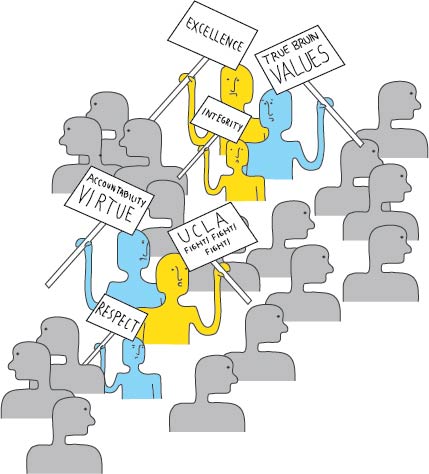It’s a sad thing to have to anticipate the annual display of bigotry and hate in Westwood.
This time, the display in question takes the form of several stickers with racist, hateful commentary posted near Campbell Hall and on the Afrikan Student Union bulletin board. The stickers, about the death of Freddie Gray in Baltimore and subsequent unrest, suggest that Gray deserved to die and that Baltimore protesters are criminals.
The ASU condemned the incident last week, calling for the administration to address the issue of a campus climate that negatively affects an already-vulnerable black community on campus. Besides the Cultural Affairs Commission, no other student group has issued a statement.
Though administrators should respond to incidents that negatively affect students, their leadership is only part of the equation when it comes to addressing campus climate. Students on this campus, not just the administration, need to be capable of recognizing racism as it occurs. All identity-based student groups, not just those directly affected by any specific racial incident, are best positioned to call attention to how racism continues to operate.
Instead of spending the student government election season drawing lines of scrimmage, these groups need to take unified and consistent action by rebuilding a broad-based progressive coalition that can regularly and forcefully tackle the topic of race, ethnicity and identity in an inclusive manner where all students can discuss racial issues openly.
Right now, unfortunately, it doesn’t seem like much broad-based coalition building is happening. While Undergraduate Students Association Council politics is not central to the objectives of these student groups, it seems like their existence has become inextricably tied with and increasingly justified by student government involvement, even as the best work is done by identity-based coalitions in the retention, outreach and access programs run through the Community Programs Office.
2014 marked a clear breakdown in the progressive coalition. The emergence of FIRED UP!, which is strongly tied to the Asian Pacific Coalition, Vietnamese Student Union, American Indian Student Association and Pacific Islands Student Association, was widely perceived as a splintering from LET’S ACT!, a group chiefly backed by Samahang Pilipino, the ASU, MEChA de UCLA, and the Queer Alliance.
The leaked documents that attempted to “expose” LET’S ACT! last week inadvertently lent insight into the degree progressive groups on this campus have fragmented. A document titled “CPO Takeover” suggests that the LET’S ACT! slate has intentions to replace the “mother organization” as UCLA’s primary progressive coalition, while seemingly calling for the ouster of the groups that later formed FIRED UP!.
This sequence of events, now revealed to the public, suggests that well-meaning student organizations have decided to, at least in part, forgo pressuring the administration and challenging the student body at large to think critically about issues of race and identity in favor of petty politicking. It represents “divide-and-conquer” politics that maintain power and prevent pressure from being exacted upon the UCLA administration that these groups were created to challenge.
To be sure, it needs to be acknowledged that individual student groups are designed to address issues and concerns that affect specific communities and that these groups should not bear sole responsibility for addressing racism on campus – the administration and the recently passed diversity requirement should play important roles in this. However, they can stand in unity to more forcefully address and condemn racism and racist incidents on the whole.
This can be done by holding joint meetings and organizing inclusive discussion and dialogue between students and faculty of differing backgrounds and disciplines. Their presence can go beyond politics, days of action and condemnatory press releases, which are important and necessary but hampered by politically-motivated bickering and coalitional fracturing.
Because while the political theater between two progressive factions unfolds, racism persists – insidious, institutional and yet still invidious to the afflicted parties.
For those who are not black, feeling unease in the supposedly “safe” community of Westwood is a difficult concept to understand. But racial profiling incidents at UCLA are a reality, not a fiction. University police’s reputation has been marred by numerous incidents of alleged racial profiling last year.
And it’s not just black students who may feel unease being on campus. In the wake of the tragic shooting of three Muslim students at the University of North Carolina at Chapel Hill in February, a significant number of South Asian and Middle Eastern students talked about their experiences of being labelled as a “terrorist” during a student group discussion.
Even Asian Americans, which make up over a third of the UCLA student body, can face racial slights in the form of microaggression, popularly summarized through the offensive line of questioning, “So where are you from?” The “model minority myth” obscures the fact that subgroups such as Cambodian, Vietnamese and Laotian Americans face low educational attainment and persistence – an issue tackled by VSU’s SEA CLEAR program.
Though the problems faced by all these groups differ greatly from one another, they are common consequences of living in a society that continues to favor, by and large, white people.
“Solidarity” is a favorite word of progressive organizations on campus. Recently, however, these groups seem to have strayed from that goal. Superficial differences need to be put aside and people need to come together to effect serious change on campus, because racism affects all, not some, people of color on campus.

